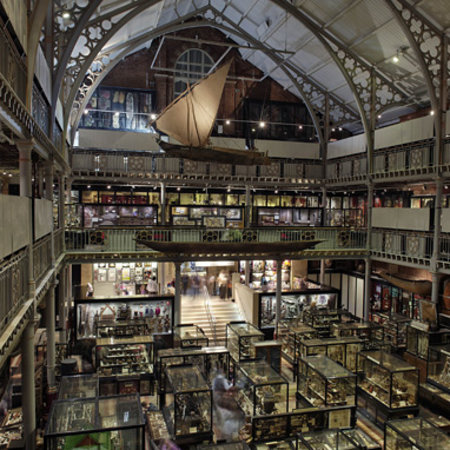How To Sort Your Stuff – making a play about museums
4th Sep 2013
Recently we hosted a 5-day workshop, giving writers an opportunity to learn new techniques for devising theatre. Isabel Quinzaños reports:
Over a few days in August, a group of budding writers, performers and directors got together at the Pitt Rivers Museum in Oxford to produce a script about both the Pitt Rivers and Ashmolean museums. Out of Joint had set out to organise an education workshop that would focus on a devising and writing technique called “verbatim theatre”, which means creating a play out of people’s words. (You’ll find some examples of this kind of play at the bottom of this article.) The process of writing verbatim plays typically involves conducting a series of interviews with people who are somehow involved with the topic or “world” you have chosen to investigate; and recording their words in order to use them later on in a play. It is like theatre’s version of documentary film.
Our group of ten participants included both mature and fledgling performers; a budding director; a professional writer; and an academics in the course of PhDs in Architecture and Literature. Led by Naomi Jones – who has directed for Out of Joint and Eastern Angles and who has taught extensively at Oxford School of Drama – they set off to interview the staff and punters of the museums to find out what goes on behind the scenes.
It involved them finding and approaching people who would be interesting to interview, recording their exact words and then transcribing them. Then, the whole material was put together, and decisions had to be made about what story they could tell. Naomi did the first edit, but all participants had an input about what they felt should be in or not. On the final day, they rehearsed the play and put on a viewing of it for museum staff and invited guests.
The result was a moving and quirky piece of theatre that gave a real insight into how museum staff create the environment that we, the visitors, experience, let alone their perspective on their favourite pieces, the ones they hate the most and what they think of their work.
Here’s a snippet:
Enter brother and sister.SISTER Well I came to see the shrunken heads
MAYA Everyone knows the Pitt Rivers for the shrunken heads. In fact they often know that, before the name of the museum ‘Is that the place with the shrunken heads?’ Yep, and 80,000 other objects!
BROTHER I wouldn’t have come today but we came to see the shrunken heads; it’s a big attraction
MAYA I definitely don’t like them. I really…I avoid that case. Obviously if I have to show – actually, we don’t tend to take the public to them because, because the media for instance, whenever they talk about the Pitt Rivers will just focus on the shrunken heads.
SISTER I don’t know why but…
BROTHER …er it’s more of a macabre thing/ it’s the most macabre thing in here
SISTER Yeah it’s very macabre…..it’s fascinating. Not just the shrunken heads, it’s everything.
BROTHER Yeah…but it’s mainly the shrunken heads with/ my sister
SISTER No it isn’t, it’s the textiles, I like the textiles.
For the participants the best thing was meeting the fascinating personalities we never meet on our regular museum visits. Learning about the thought process behind the placement of each object in the museum. What is written about those objects, to tell us a story. In the end, the work the museum staff do is as much about us as visitors as it is about the objects they safeguard. The script is now in the Pitt Rivers archive – maybe they’ll let you have a read if you ask nicely.
Verbatim theatre – some examples
YESTERDAY’S NEWS
Max Stafford-Clark and Bill Gaskill’s Joint Stock Theatre Group produced this piece because, as Gaskill tells it, they were at a loss for what to do next and decided to look through the newspapers for a story. The play was written from the company’s subsequent interviews with Angolan mercenaries.
THE LARAMIE PROJECT
by Tectonic Theater Project, about the murder of Matthew Shepard and the media storm that followed it.
LONDON ROAD
by Alecky Blythe and Adam Cork – the National Theatre’s verbatim musical about the impact on the community of the Ipswich prostitute murders.
THE PERMANENT WAY
by David Hare – about the privatisation of Britain’s railways and the four train crashes that happened shortly afterwards.
TALKING TO TERRORISTS
by Robin Soans
JUSTIFYING WAR
The Tricycle Theatre condensed the Hutton Inquiry into the Iraq war into 2 hours of theatre
WAITING ROOM GERMANY
Commissioned from Klaus Pohl by Der Spiegel to test the mood of Germany after reunification.
THE EXONERATED
Stories of six innocent survivors of death row.
THE CARAVAN
Look Left Look Right’s play told the stories of those worst affected by the 2007 floods.





